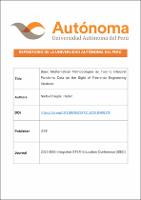| dc.contributor.author | Nieto-Chaupis, Huber | |
| dc.date.accessioned | 2024-04-04T22:57:46Z | |
| dc.date.available | 2024-04-04T22:57:46Z | |
| dc.date.issued | 2023 | |
| dc.identifier.uri | https://hdl.handle.net/20.500.13067/3083 | |
| dc.description.abstract | Along these last years (2020-2022) a lot attention has been paid on all types of information concerning to the pandemic of Corona virus 2019 and recently Monkeypox-2022. Mainly the information about the evolution of pandemics has been resumed in terms of infections and projections from a statistical analysis of world-wide data. However, one can wonder: Which material (or academical topics) and methodology might be of interest to engineering students in order that them can extract their own view and perspective on the pandemic and how it can be valuable for local public health operators? | es_PE |
| dc.format | application/pdf | es_PE |
| dc.language.iso | eng | es_PE |
| dc.publisher | IEEE | es_PE |
| dc.rights | info:eu-repo/semantics/restrictedAccess | es_PE |
| dc.rights.uri | https://creativecommons.org/licenses/by-nc-nd/4.0/ | es_PE |
| dc.subject | Covid-19 | es_PE |
| dc.subject | Monkeypox | es_PE |
| dc.subject | Education | es_PE |
| dc.title | Basic Mathematical Methodologies as Tool to Interpret Pandemic Data on the Sight of Freshman Engineering Students | es_PE |
| dc.type | info:eu-repo/semantics/article | es_PE |
| dc.identifier.journal | 2023 IEEE Integrated STEM Education Conference (ISEC) | es_PE |
| dc.identifier.doi | https://doi.org/10.1109/ISEC57711.2023.10402175 | es_PE |
| dc.subject.ocde | https://purl.org/pe-repo/ocde/ford#2.02.04 | es_PE |


